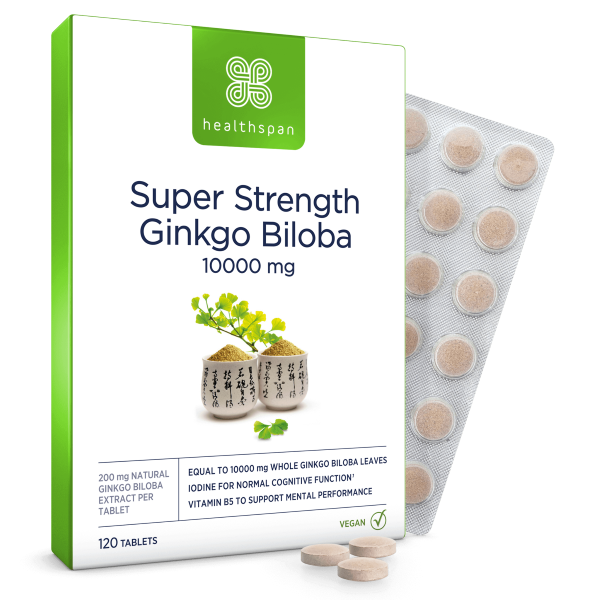Eating foods rich in vitamins, minerals and fatty acids, as well as exercising regularly, can protect and support your brain health.
Scientists also believe regular exercise and a healthy diet, could help stave off mental decline, such as dementia. One large-scale study, published by The Lancet, assessed 2,654 people aged 60 to 77 and found diet, exercise and cognitive training improved or maintained cognitive functioning for those who were at risk of dementia.1
Exercise and brain health
It's recommended we all do at least 150 minutes of moderate aerobic activity every week.2 Aerobic exercise is good for the brain because it helps to increase blood circulation and oxygen supply. Here are some of the ways exercise can benefit brain health.
- Get your heart pumping: Cardio and aerobic exercise, such as running or cycling, increase your heart rate, pumping more oxygen to the brain. Aim to do five 30-minute sessions a week, working hard enough to raise your heart rate and be slightly out of breath.3 One 2017 study found regular aerobic exercise, in women aged 70 to 80 with mild cognitive impairment, boosted the size of the hippocampus, the part of the brain responsible for verbal memory and learning.4
- Learn Tai Chi to boost brain function: A 2017 study, published by the British Journal of Sports Medicine, found taking part in a weekly 45 to 60-minute session of Tai Chi or aerobic exercise improved cognitive function for the over 50s.5
- Try quick bursts of activity to improve concentration: Physical activity can help you focus. One study found 20-minute bouts of exercise in school children improved their attention spans.6
- Exercise to fight depression: Exercise can boost your mood by stimulating the release of endorphins or 'feel good' brain chemicals.7 One review concluded the effectiveness of exercise for easing symptoms in depressed patients was well established.8
Diet and brain health
Eating a healthy diet is important for your mental as well as physical health. Here are some ways you can support your brain through diet:
- Increase your B vitamins: Vitamin B plays a major role in the functioning of the brain and nervous system.9 A deficiency could affect memory function, cognitive impairment and dementia. One review found eating higher amounts of unsaturated fatty acids, antioxidants and B vitamins decreased the risk of dementia.10 B12 can be found in dairy products, eggs, meat and fish. B6 is available in meat; fish; vegetables such as bell peppers, spinach and baked potatoes; and beans and legumes, such as chickpeas and lentils. To keep B vitamins topped up, consider taking a supplement.
- Eat fatty acids: Fatty acids such as omega 3s support brain health. One study found taking omega 3 supplements had significant benefits to memory function in healthy 50 to 75 year olds, compared to a placebo group.11 Rich sources of omega 3 include oily fish such as salmon, sardines, mackerel and trout. If you're not a big fan of fish, it can be found in flaxseed and walnuts as well. Alternatively, you could take a supplement.
- Feast on fermented foods: Your brain and gut are closely connected and research has shown gut bacteria may affect your brain function. One study found brain function changed among healthy women who consumed probiotics in yogurt.12 Fermented foods such as yogurt, miso and sauerkraut contain probiotics. Or opt for a supplement with friendly bacteria which can help to restore the natural balance of bacteria in the gut.
- Keep hydrated: If you're dehydrated, you may be finding it hard to concentrate or think clearly. In one study, researchers found that people who quenched their thirst with a glass of water before conducting mental tasks had reaction times 14 per cent faster than those who didn't.13 Drink around two litres of water a day.14
- Factor in vitamin D: Vitamin D is produced in the skin on exposure to sunlight and is vital for healthy bones, teeth, and muscles. Recent research suggests low levels of vitamin D may be associated with dementia. A study, published by JAMA Neurology, found low vitamin D levels were associated with an accelerated decline in cognitive function.15 Vitamin D is found in many foods, including: egg yolks; oily fish (salmon, mackerel, herring and sardines); dairy products and fortified margarines; and meat (liver and kidney). Sunshine, not food, is the main source, however, and in autumn and winter supplements can provide a top-up.16
- Cut down on alcohol: Alcohol alters your brain chemistry and can affect how you think and feel.17
Supplements
Several supplements that can support your emotional and mental wellbeing.
- Ginkgo Biloba is often used to support cognitive function. One study found it improved concentration and mood.18
- B vitamins can help to contribute to a normal mental performance. A study found that people suffering with depression responded much better to treatment if they had higher levels of B12 in their blood.19
- Omega 3 supports brain, eye and heart health. A study found people who took cod liver oil every day were less likely to have symptoms of depression than those who didn't.20

Super Strength Ginkgo Biloba 10,000mg
Maximum strength ginkgo extract for cognitive and mental function
- One-a-day tablet of naturally potent ginkgo biloba extract
- Contribute to cognitive function and mental performance/li>
- Help combat tiredness and fatigue






